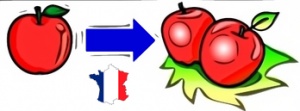Difference between revisions of "Language/French/Grammar/Plural"
m (Quick edit) |
|||
| Line 77: | Line 77: | ||
[[Category: French/Beginner]] | [[Category: French/Beginner]] | ||
[[Category: French/Grammar]] | [[Category: French/Grammar]] | ||
==Related Lessons== | |||
* [[Language/French/Grammar/The-partitive-article-"du",-"de-l'",-"de-la"-and-"des"|The partitive article "du", "de l'", "de la" and "des"]] | |||
* [[Language/French/Grammar/Quantifiers-and-personal-pronouns|Quantifiers and personal pronouns]] | |||
* [[Language/French/Grammar/The-irregular-verb-être|The irregular verb être]] | |||
* [[Language/French/Grammar/Meaning-of-tout-à-l'heure|Meaning of tout à l'heure]] | |||
* [[Language/French/Grammar/Typical-use-of-the-definite-article|Typical use of the definite article]] | |||
* [[Language/French/Grammar/Common-quantifiers|Common quantifiers]] | |||
* [[Language/French/Grammar/Well-Better-Worse|Well Better Worse]] | |||
* [[Language/French/Grammar/Position-of-y-and-en-with-negative-infinitives|Position of y and en with negative infinitives]] | |||
* [[Language/French/Grammar/Gender-of-the-noun-indicated-by-its-final-letter|Gender of the noun indicated by its final letter]] | |||
* [[Language/French/Grammar/Direct-object-quantifiers-and-«-en-»|Direct object quantifiers and « en »]] | |||
Revision as of 17:21, 26 February 2023
This article explains how to use the plural in French.
In general, the French nouns form the plural by adding an '-s' to the singular:
- un cahier / des cahiers (a notebook / notebooks)
You will find below the exceptions to this rule:
's', 'x' or 'z'
Singular nouns ending with 's', 'x' or 'z' do not change at plural:
- le fils / les fils (the son / the sons)
'-au', '-eau' or '-eu'
Singular nouns ending with '-au', '-eau' or '-eu' ends with an '-x' at plural:
- le feu / les feux (the fire / fires).
except :landau (s), sarrau (s ), bleu(s) , pneu (s )
'-ou'
Words ending in 'OU' take an 'S' except for the following words ending in 'X':
- bijou (jewel)
- caillou (pebble)
- chou (cabbage)
- genou (knee)
- hibou (owl)
- joujou (toy)
- pou (louse)
'-al'
Singular nouns ending with '-al' change their termination to '-aux':
- le cheval / les chevaux.
Some words have a regular plural and take an '-s'. The most common exceptions are : aval (downstream or approval), bal (ball, dance), carnaval, cérémonial, chacal (jackal), festival, narval (narwhal), récital, régal (delight), natal (native),
Glacial (cold) can be "glacials" or "glaciaux" in the plural
'-ail'
Words that ends with "ail" in plural take "s"
Except :
- some words takes ''aux" in plural instead of "s" like : bail / baux (lease), émail / émaux (enamel), soupirail /soupiraux (basement window), vitrail / vitraux (stained glass), vantail / vantaux (door panel), travail / travaux (job), corail / coraux (coral)
Plural of compound names
Some names are composed of two words, sometimes three.In general, only nouns and adjectives take the plural mark. Verbs, adverbs and prepositions are invariable.
Exemples :
- des sourds-muets (deaf-mute) = adjective+adjective
- des porte-documents (portfolio) =verb+noun
- des haut-parleurs (speakers) = adverb+noun
But the plural also depends on the meaning of the words.
Exemples :
- des wagons-lits (sleepers coaches) = noun+noun, and there are several cars and several beds per car.
- des kilomètres-heure (kilometres per hour) = several kilometres but only one hour.
"Demi" (half) et "semi" (semi) are invariable if they are placed before the name.
Exemples:
- des demi-heures (half-hours)
- des semi-remorques (semi-trailers)
VIDEOS
Plural of nouns in French:
Related Lessons
- The partitive article "du", "de l'", "de la" and "des"
- Quantifiers and personal pronouns
- The irregular verb être
- Meaning of tout à l'heure
- Typical use of the definite article
- Common quantifiers
- Well Better Worse
- Position of y and en with negative infinitives
- Gender of the noun indicated by its final letter
- Direct object quantifiers and « en »
